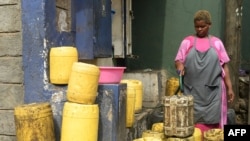ເລຂາທິການໃຫຍ່ຂອງອົງການສະຫະປະຊາຊາດ ໄດ້ຮຽກຮ້ອງ ໃຫ້ມີການໃຫ້ຄໍາຫມັ້ນສັນຍາ ແລະການລົງທືນທີ່ສໍາຄັນ ເພື່ອຫລີກລ້ຽງວິກິດການນໍ້າໃນທົ່ວໂລກທີ່ກຳລັງເພີ່ມຂຶ້ນ ໃນໄລຍະເລີ່ມຕົ້ນຂອງກອງປະຊຸມໃຫຍ່ ກ່ຽວກັບບັນຫາດັ່ງກ່າວ ໃນວັນພຸດວານນີ້.
ທ່ານອັນໂຕນີໂອ ກູເຕີເຣັສ (Antonio Guterres) ກ່າວຕໍ່ຫ້ອງປະຊຸມສະມັດຊາໃຫຍ່ ທີ່ໜ້າແໜ້ນວ່າ "ນ້ຳແມ່ນສິດທິມະນຸດ - ແລະມີສ່ວນໃນການພັດທະນາຮ່ວມກັນເພື່ອກຳນົດອະນາຄົດທີ່ດີຂຶ້ນ. "ແຕ່ນໍ້າກໍາລັງມີບັນຫາຢ່າງໜັກ."
ກອງປະຊຸມທີ່ດຳເນີນເປັນເວລາ 3 ວັນ, ເຊິ່ງໄດ້ໄຂຂຶ້ນໃນວັນນ້ຳຂອງໂລກ, ຖືເປັນຄັ້ງທຳອິດ ໃນຮອບ 46 ປີ. ບັນດານັກເຄື່ອນໄຫວ ແລະນັກຊ່ຽວຊານກ່າວວ່າ ວິກິດການນ້ຳທີ່ກຳລັງດຳເນີນຢູ່ນັ້ນ ເປັນໄພຂົ່ມຂູ່ຕໍ່ໂລກທັງໝົດ.
ອີງຕາມອົງການສະຫະປະຊາຊາດ, ຫນຶ່ງສ່ວນສີ່ຂອງໂລກ - 2 ຕື້ຄົນ - ບໍ່ສາມາດເຂົ້າເຖິງນໍ້າດື່ມທີ່ປອດໄພໄດ້. ມັນຈະຮ້າຍແຮງຂຶ້ນ. ຮອດປີ 2030, ຄວາມຕ້ອງການນ້ຳຈືດ ຄາດວ່າຈະເກີນ 40% ໃນທົ່ວໂລກ.
The U.N. secretary-general called for significant commitments and investment Wednesday to avert a growing global water crisis at the start of a major conference on the issue.
“Water is a human right — and a common development denominator to shape a better future,” Antonio Guterres told a packed General Assembly hall. “But water is in deep trouble.”
The three-day conference, which kicked off on World Water Day, is the first of its kind in 46 years. Activists and experts say the ongoing water crisis is a threat to the entire planet.
According to the United Nations, a quarter of the planet — 2 billion people — does not have access to safe drinking water. It will only worsen. By 2030, the demand for fresh water is expected to exceed supply by 40% globally.
Meanwhile, half the world — 3.6 billion people — live without safely managed sanitation. This is deadly. The World Health Organization and the U.N. children’s agency (UNICEF) say at least 1.4 million people — many of them children — die each year from preventable causes linked to dirty water and poor sanitation. Cholera and other water-related diseases are once again on the rise.
Guterres urged massive investment in water and sanitation systems, saying the international community cannot manage an emergency with outdated infrastructure.
Climate change is accelerating the water problem, contributing to both severe drought and floods.
“Climate action and a sustainable water future are two sides of the same coin,” the secretary-general said. “We must spare no effort to limit global warming to 1.5 degrees Celsius and deliver climate justice to developing countries.”
Conference organizers say game changing action is needed now to manage water better and achieve international water goals and targets to prevent a more severe crisis.
The United States announced Wednesday that it is committing more than $49 billion to advance access to climate-resilient water and sanitation infrastructure both domestically and abroad.
“These investments will help create jobs, prevent conflicts, safeguard public health, reduce the risk of famine and hunger, and enable us to respond to climate change and natural disasters,” U.S. Ambassador to the U.N. Linda Thomas-Greenfield told reporters.
The Netherlands and Tajikistan are co-hosting the conference, which aims to get hundreds more commitments from governments, the private sector and civil society by the end of this week for its Water Action Agenda.
“Everything we need to live a decent life is related to water — our health, food, safety, habitat, economy, infrastructure and climate,” Dutch King Willem-Alexander said at the conference. “Water security is one of the defining concerns of our time and will determine our collective sustainable future.”




